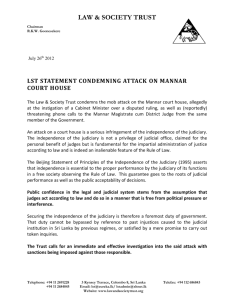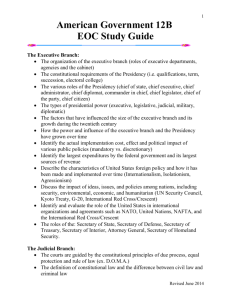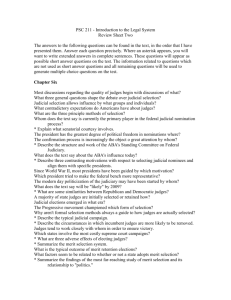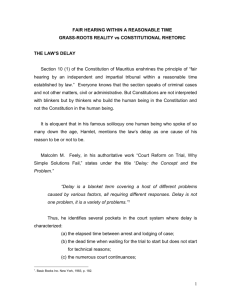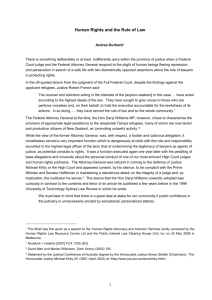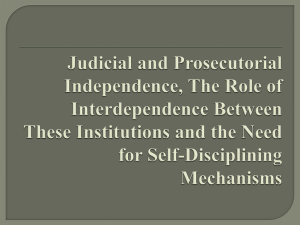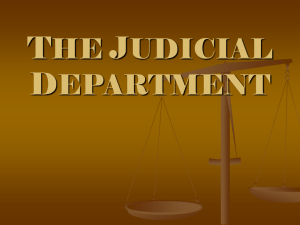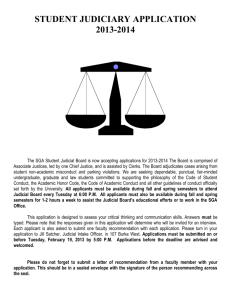Judicial Independence - Department of Justice
advertisement
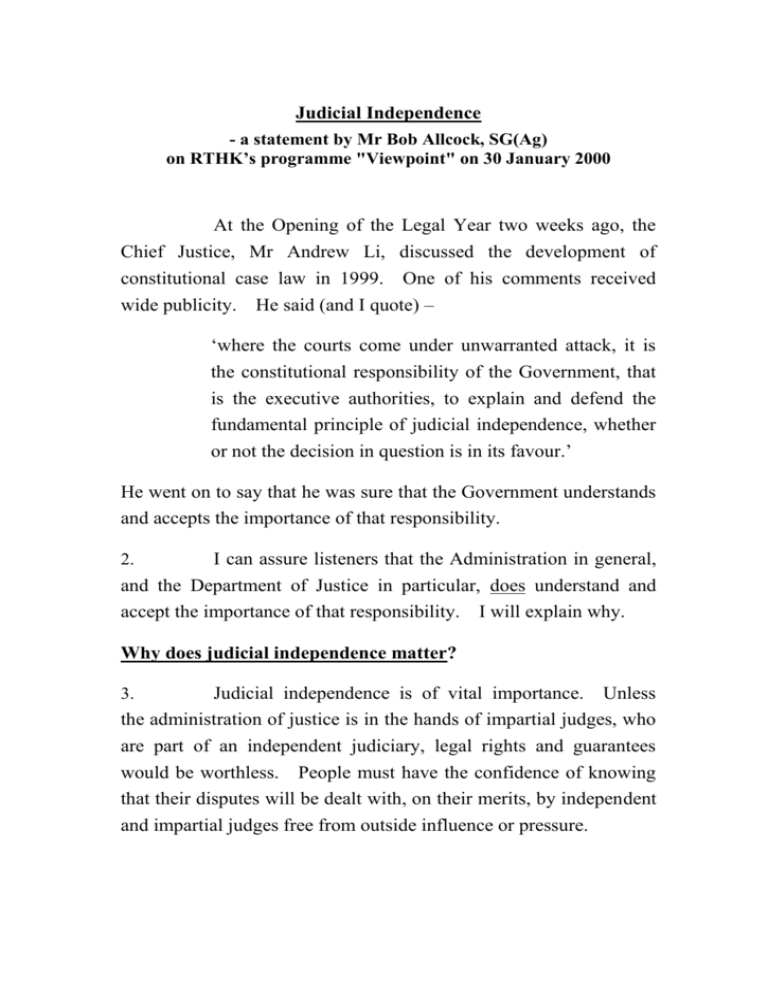
Judicial Independence - a statement by Mr Bob Allcock, SG(Ag) on RTHK’s programme "Viewpoint" on 30 January 2000 At the Opening of the Legal Year two weeks ago, the Chief Justice, Mr Andrew Li, discussed the development of constitutional case law in 1999. One of his comments received wide publicity. He said (and I quote) – ‘where the courts come under unwarranted attack, it is the constitutional responsibility of the Government, that is the executive authorities, to explain and defend the fundamental principle of judicial independence, whether or not the decision in question is in its favour.’ He went on to say that he was sure that the Government understands and accepts the importance of that responsibility. I can assure listeners that the Administration in general, and the Department of Justice in particular, does understand and accept the importance of that responsibility. I will explain why. 2. Why does judicial independence matter? Judicial independence is of vital importance. Unless the administration of justice is in the hands of impartial judges, who are part of an independent judiciary, legal rights and guarantees would be worthless. People must have the confidence of knowing that their disputes will be dealt with, on their merits, by independent and impartial judges free from outside influence or pressure. 3. 2 How is judicial independence guaranteed? The Basic Law guarantees the continuity of judicial independence. In particular, it provides that judges shall be appointed on the recommendation of an independent commission, and shall have security of tenure. 4. In practice, there is no doubt that every judge in Hong Kong, in deciding a case, does so according to his or her own judgment, and without fear or favour. 5. Constitutional controversies Nevertheless, judgments are sometimes controversial. Courts and judges are not immune from criticism. Judgments on important issues should be vigorously debated in a society that values the freedom of expression. However, as the Chief Justice remarked in his speech, it is important that any such debate should be objective and rational. But what can be done if it is not? 6. Contempt of court In extreme cases, criticism may amount to contempt of court. Where this is so, the Secretary for Justice can bring proceedings against those responsible, and the court can impose penalties on them. This happened in 1998, when a local newspaper carried out a campaign aimed at members of a tribunal and the judiciary. Its articles were published maliciously, in bad faith, and were ‘scurrilous, abusive, shocking and reprehensible’. 7. However, criticism must pass over a very high threshold before it amounts to contempt of court. It must be calculated to undermine public confidence in the administration of justice. Some 8. 3 comments on decisions of the Court of Final Appeal last year were highly critical. But the Department of Justice, having considered them very carefully, came to the view that none amounted to contempt of court. What else can be done? Where critical comments do not amount to contempt of court, what should be done about them? Some commentators have suggested that the Secretary for Justice should defend all court decisions. Does this mean that, if someone says a particular decision was wrong, the Secretary for Justice should publicly disagree, and state that it was correct? This cannot be right. It suggests that court decisions need the endorsement, or seal of approval, of the Secretary for Justice. Such a view undermines, rather than supports, the independence of the judiciary. 9. What, then, is the duty of the executive? According to the Chief Justice, its duty is ‘to explain and defend the fundamental principle of judicial independence.’ 10. Defending judicial independence If, for example, someone should suggest that only those lawyers who support the government should be appointed as judges, or only those judges who give decisions favourable to the government should be promoted, this would clearly be an attack on judicial independence. The government would then be under a constitutional duty to explain that such suggestions were inconsistent with judicial independence, and to refuse to accept them. 11. 4 The Administration accepts that it has this duty, and is alert to discharge it if necessary. For example, after the Court of Final Appeal’s first decision in the right of abode cases, last January, some critics suggested that the court should be asked to ‘rectify’ its judgment. The Administration refused to ask the court to do so, although it did seek a clarification of its decision. As the Administration subsequently explained, there was no legal basis for asking the court to reverse its original judgment where there was no case before it, nor would it be acceptable to do so. It also explained that if, in another case, the court were invited to reconsider its decision, it would be unlikely to come to a different conclusion. It pointed out that, if the court did come to a different conclusion, it might be criticised as having yielded to political pressure instead of making a rational judicial decision. This would have damaged the court’s credibility. 12. Instead, another way was found to resolve the problems arising from the decision. That was to request the Standing Committee of the National People’s Congress to exercise its power to interpret the Basic Law. This solution was, of course, controversial. But it was lawful and constitutional, and it avoided subjecting the courts to political pressure. 13. Throughout the controversies of last year, the Department of Justice remained respectful of the judiciary. Indeed, members of that Department must do their best to inspire respect for the judiciary. As a former president of the American Bar Association said – 14. ‘If respect for the courts and for their judicial process is gone or steadily weakened, no law can save us as a 5 society. Lawyers, whatever their views on controversial decisions, must inspire respect for the judiciary.’ My colleagues in the Department of Justice and I have the greatest respect for members of the Hong Kong judiciary. And I urge you all to share our confidence in their ability, integrity, impartiality and independence.
